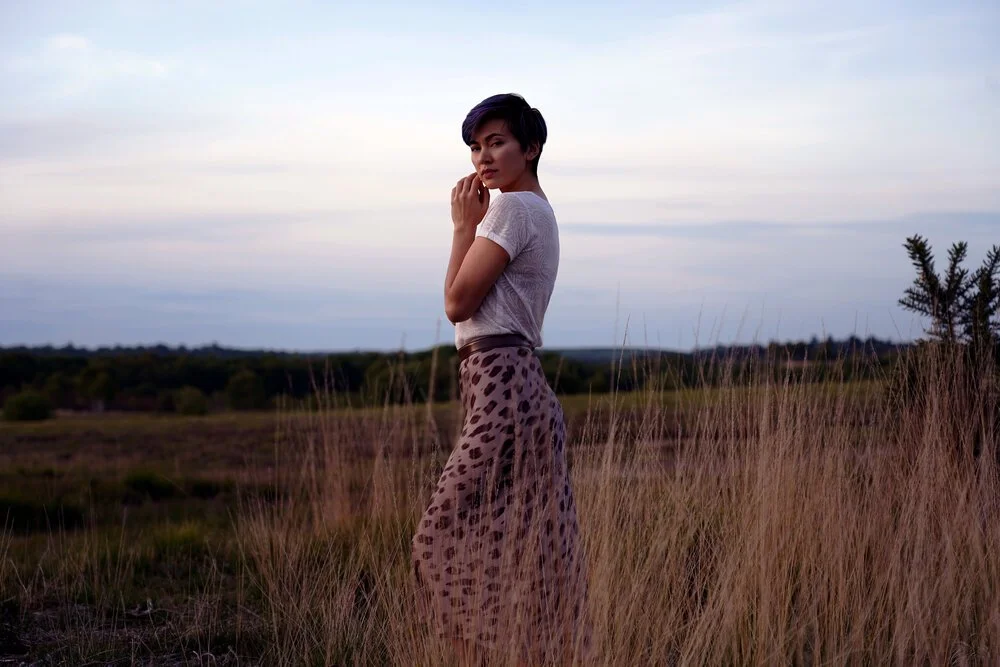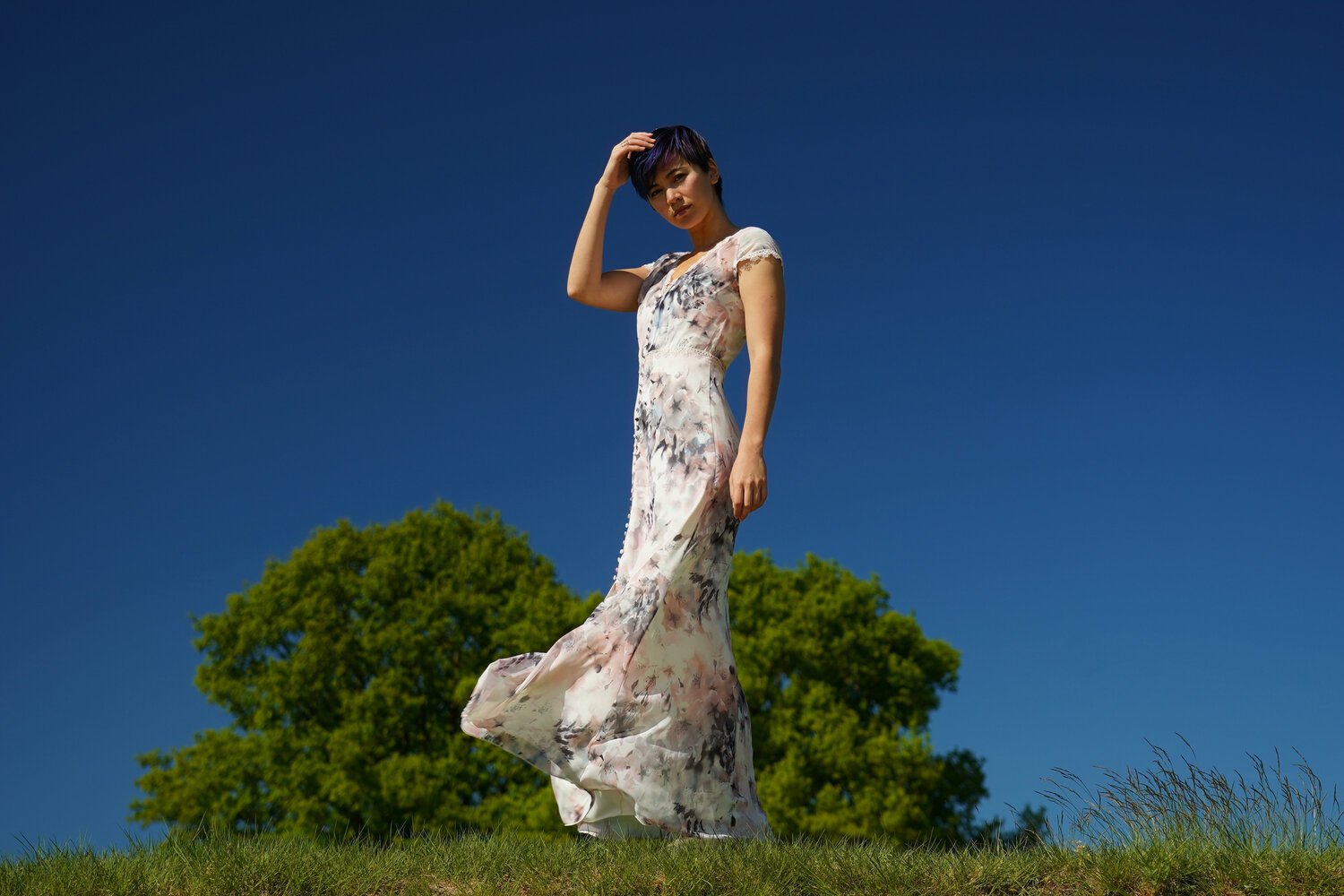Jessica Henwick: The Hapa Franchise Queen on Growing Up Between Two Cultures
Hapa Mag - SEPTEMBER 16, 2020
Intro by Lauren Lola
Interview by Lauren W. and Lauren Lola.
Photos by Gideon Henwick
Jessica Henwick has become a boss on the big and small screens. From her debut as the first lead actress of East Asian descent on the BBC series, Spirit Warriors, to now starring alongside fellow Hapa, Keanu Reeves, in the upcoming Matrix installment, her career has been nothing short of prolific.
Being of part Chinese-Singaporean descent, Henwick is familiar with the limited opportunities afforded to women and people of color. While she is a vital figure in representing both the Asian and mixed-race communities, she also uses her position to continue making space for future talent.
While filming for The Matrix 4 in Germany, Henwick kindly took some time to tell us about her journey.
Interview
What makes you Hapa? Do you identify with this word?
We actually don't use this term in England, though the closest equivalent I can think of is "Eurasian," which is how I identify. Even in England, Eurasian is not a well-known phrase, so the response is generally, "Huh?" I love that Hapa is such a recognised term in the States. When I first visited Hawaii, I was called Hapa all the time. It's nice to acknowledge mixed-race ancestry — it's more than just DNA. It's about your interests, your palate... being raised with a foot in two different cultures. The beauty of that, as well as the obstacles you face.
How was it for you growing up in England? Were there other Hapas around you, or were you one of a few?
I grew up in an area with no Asians. My brothers and I were the first non-white students at our school. It was rough, I won't lie. But it built in me a mental armor that got me to where I am today.
I find it interesting to look back at just how effectively I would compartmentalise. I think anyone who has grown up between two cultures can understand this. I would completely code switch, depending on where I was and who I was with. I had two lives; the first where I went to a Roman Catholic school, ate mashed potatoes at lunch and played Conkers with the kids in the playground, and the second where I would spend months with my Ma running up jungle trails in Ipoh, staining my hands purple with mangosteen and bathing out of a rainwater bucket.
When I would go to Singapore or Malaysia, our friends there would struggle to understand my British accent for the first few weeks. And when I returned to the UK, my school friends would laugh at me because my voice had changed, they said. I could not for the life of me hear it, but I'm sure they were right.
You were the first actress of East Asian descent to play a lead in a British television show when you took on the role of Bo in the BBC series Spirit Warriors. Did you realize you were making history? What did you think about this at the time the show aired, and what comes to mind now?
I don't think I grasped it fully at the time. It's both wonderful and depressing. I mean, the year was 2010. British TV started in the 1920s... I'm so grateful to our creator, Jo Ho, for really pushing to break those boundaries. She was met with resistance every step of the way, but she never backed down. It was inspiring to me as a teenager, to see this British Chinese woman changing the shape of the industry. We're mahjong buddies now. That show also began a lifelong friendship with Benedict Wong, who played my father.
Despite being half-Asian, you carried the weight of Asian representation for Iron Fist, a show that already received criticism for not casting an Asian lead with source material accused of cultural appropriation. What was it like bearing that responsibility?
Put it this way, I didn't have any grey hairs five years ago.
I tried. I really, really tried to be mindful of any cultural issues — in the scripts, props, costumes... Many discussions were had. What I can say is that Colleen was a beautiful part of my life. She's a badass, mixed-race Asian woman who was brainwashed by a cult and now helps clean up the streets! She's the reason I signed on and I'm grateful for every moment I got to play her.
You’ve done both — you’ve occupied roles that were colorblind cast and roles that required specific racial casting. Do you ever do anything to position yourself as more or less mixed-Asian? For instance, makeup, speech cadences, visual nods in your headshots, etc.
No. If they're looking for a full Chinese actress, we're in a time now where I won't get in the door. If they're looking for a full Caucasian actress, well you know the rest. It's interesting, I'm not sure other ethnicities are held to the same level. But I understand how we've reached this point. The reality as a mixed-race Asian is that the production has to be open-minded — very few projects are specifically looking for Hapas.
You’re a bit of a Franchise Queen at this point with Game of Thrones, Star Wars, Marvel, and now The Matrix. We can’t not comment on this — you’re in a movie with a very famous Hapa, one of the original and most well-known ones. What’s it like acting opposite Keanu Reeves?
It's a dream! I had a pinch-me moment my first day on set, seeing him in his costume, hearing the voice. That voice! He has that je ne sais quoi, everyone is effortlessly charmed by him.
You’ve started exhibiting your skills as a writer in recent years. You’ve written short films such as Baliko and The Heart of the Forest, and earlier this summer, it was announced that Amazon will be picking up the series that you co-wrote, Nancy Wu Done It. How would you describe your experience of writing for the industry so far and what inspired you to take on writing in the first place?
I started writing about five years ago. At the time I was very disillusioned with the opportunities available to women — especially women of colour, or women of a certain age. That's how my first short with Lourdes Faberes came about, The Heart of the Forest. With my second short Baliko, I was personally thinking about the pressure I felt to choose between a career or a family life, and the more toxic side to pursuing art; pursuing recognition.
Nancy Wu Done It came at a strange moment in my life — I had just received the call that the Marvel Netflix shows were cancelled, and I was staying in Qingdao in the winter — a fairly remote part of China. For the first time in years I didn't have a single film or TV contract in front of me. It's both a liberating feeling and quite daunting. Would I ever work again? I obviously can't discuss the show too much, but... it's all in there, haha. Writing is so liberating. To every Asian out there who feels they aren't represented or seen in media — we need you. Now is the time.
Do you ever see yourself writing a show or a film that hones in on the complexities of being a person who’s mixed-race?
I actually wrote a miniseries specifically about this, which has been optioned by Emu Films in the UK. Hopefully I'll be able to discuss this in more detail soon!
End of Interview
Henwick can next be seen in the upcoming Netflix animated series, Gods & Heroes.
Her new film, On the Rocks, comes out October 2nd and Monster Problems comes out October 16th.
Lauren Winn is a pop culture whackjob who works in fashion. She is a sucker for genre-meshed aesthetics, a textbook workaholic, a bona-fide digital media queen, and the sum of many rotating hyperfixations. If you want to get on her good side greet her with a Lacroix or follow her on insta @laurennakaowinn.
Lauren Lola is a San Francisco Bay Area-based author, freelance writer, playwright, and screenwriter. She is the author of the novels, An Absolute Mind and A Moment’s Worth. She has written plays that have been produced at Bindlestiff Studio in San Francisco, and in 2020, she made her screenwriting debut with the short film, Breath of Writing, from Asiatic Productions. Aside from Hapa Mag, Lauren has also had writing featured on The Nerds of Color, CAAMedia, PBS, YOMYOMF, and other outlets and publications.
You can find Lauren on Twitter and Instagram @akolaurenlola and on her website, www.lolabythebay.wordpress.com.





